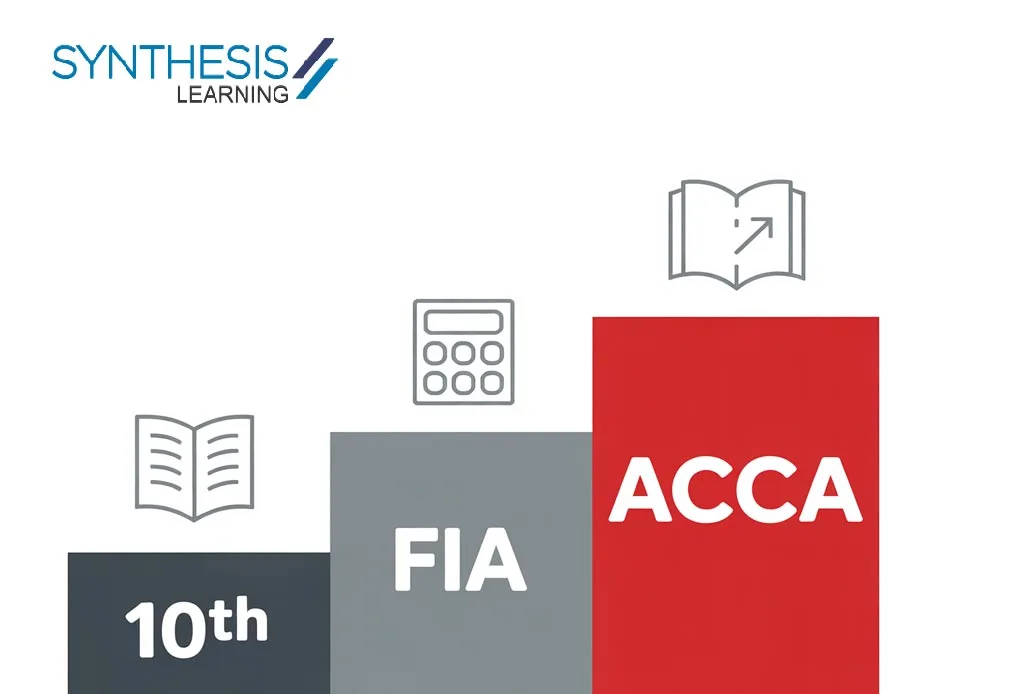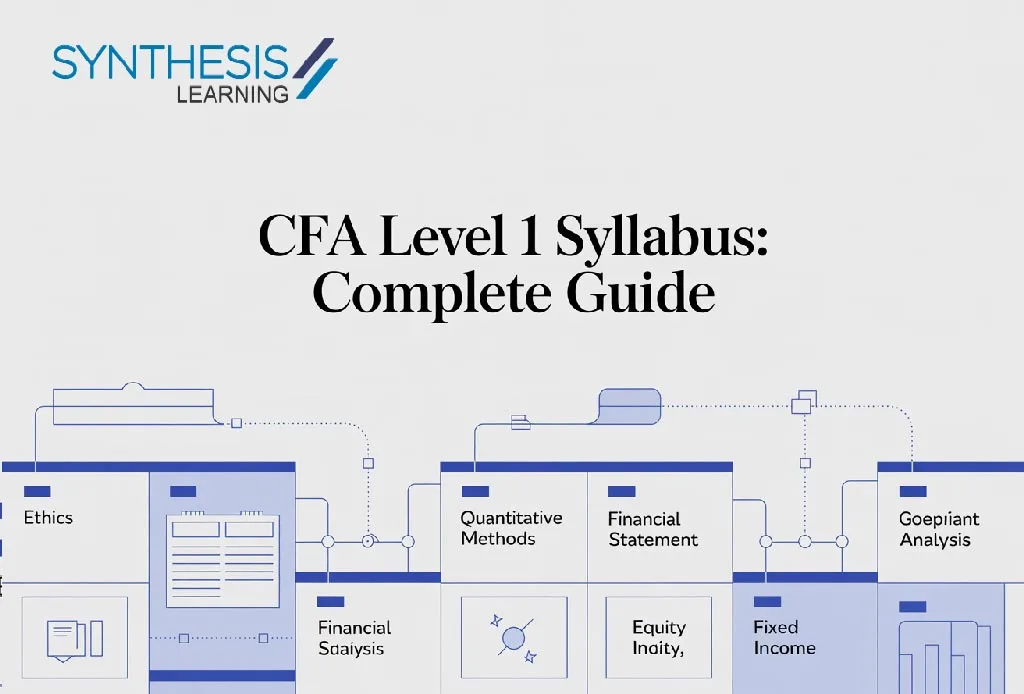ACCA vs CFA: The Biggest Dilemma
Thinking of a career in finance but unsure which qualification suits you best? ACCA and CFA often top the list for ambitious students, each opening doors to respected and rewarding roles. Still, understanding how they differ can feel confusing at first. In this blog, we break down ACCA vs. CFA in a simple, practical way, helping you choose the path that aligns with your skills, interests, and long-term career goals.
To know more, check out the video below:
Which Qualification Will Shape Your Finance Career Path?
ACCA (Association of Chartered Certified Accountants) and CFA (Chartered Financial Analyst) are internationally recognised qualifications. Each serves as a gateway to prestigious careers in finance. Despite their shared global standing, they differ significantly in focus, career direction, and professional outcomes. These differences resemble distinct highways, each leading to a unique financial landscape.
What Does ACCA Offer Aspiring Business and Finance Professionals?
ACCA course is a professional qualification with a strong emphasis on accounting, finance, and business management. It is administered by the Association of Chartered Certified Accountants, a UK-based professional body headquartered in London.
Key highlights of ACCA include:
- Focus on accounting, finance, and business leadership
- Global recognition across industries
- Strong relevance to both corporate and professional services
Global presence of ACCA:
- 250,000+ members
- 526,000 students
- Presence in more than 181 countries
This extensive global reach makes ACCA a highly versatile qualification. It suits professionals seeking international mobility and cross-border career opportunities.
How Does the CFA Program Define Excellence in Investment Management?
The Chartered Financial Analyst (CFA) Program is administered by the CFA Institute. It is widely regarded as the gold standard for investment analysis & portfolio management, headquartered in the USA.
Key highlights of CFA include:
- Strong focus on investment analysis and portfolio management
- Emphasis on ethics and professional conduct
- Highly specialised finance credential
Global presence of CFA:
- Over 166,000 charterholders
- Representation across 135 countries
CFA holds strong respect among employers operating in capital markets. It is especially valued in investment-driven and asset management environments.
CFA vs ACCA: Understanding the Eligibility Criteria
Eligibility often becomes the first deciding factor when choosing between ACCA and CFA. Both qualifications follow distinctly different entry pathways, reflecting their professional focus and the stage at which candidates are expected to commit.
ACCA Eligibility
ACCA is known for its flexible and inclusive eligibility structure. It allows candidates to begin the qualification at multiple academic or professional stages, making it suitable for students, graduates, and working professionals.
Key ACCA entry routes include:
After Grade 10 or 12
Candidates can start through foundation-level courses that build core accounting and business knowledge.
After Graduation (B.Com or M.Com)
Graduates can enter directly at the skill or professional level. Exemptions are granted based on academic background.
After CA Inter or CA Final
Candidates may receive up to 9 exemptions, significantly reducing the number of exams.
This flexibility allows aspirants to start ACCA early, transition into it mid-career, or use it as a global extension to existing Indian qualifications.
CFA Eligibility
The CFA programme follows a more structured and standardised eligibility route. It is designed primarily for candidates planning a long-term career in finance and investment management.
CFA eligibility structure includes:
- Be within 23 months of your expected graduation date.
- Candidates can begin preparation in the first year of graduation.
- The Level I exam can be attempted in the second year of graduation.
- No exemptions are offered, regardless of academic or professional background.
This uniform entry model ensures consistency across global candidates and aligns CFA closely with early-career finance professionals.
ACCA vs CFA: Eligibility Comparison Table
| Criteria | ACCA | CFA |
| Minimum Academic Entry | Grade 10 or 12 (via foundation route) | Be within 23 months of your expected graduation date. First year of graduation (preparation) |
| Exam Attempt Eligibility | Depends on entry route and exemptions | Level I from second year of graduation |
| Graduate Entry | Direct entry with exemptions (5 exemptions) | Direct entry, no exemptions |
| Professional Exemptions | Up to 9 (CA / CMA) | Not available |
| Flexibility | Highly flexible | Structured and standardised |
| Ideal Career Stage | Students, graduates, working professionals | Early-career finance aspirants |
ACCA vs CFA: Understanding the Subjects Structure
The subject structure of ACCA and CFA reflects the professional outcomes each qualification is designed for. While ACCA follows a tiered progression across accounting and business disciplines, CFA focuses on deep financial analysis and investment decision-making.
ACCA Subjects
ACCA is divided into three progressive levels, with each level strengthening conceptual knowledge, practical application, and strategic expertise.
Knowledge Level
This level builds a strong foundation in accounting principles and business understanding.
Subjects include:
- Business and Technology (BT)
- Management Accounting (MA)
- Financial Accounting (FA)
Skill Level
The skill level focuses on applying accounting and finance concepts to real-world business scenarios.
Subjects include:
- Corporate and Business Law (LW)
- Performance Management (PM)
- Taxation (TX)
- Financial Reporting (FR)
- Audit and Assurance (AA)
- Financial Management (FM)
Professional Level
The professional level develops strategic thinking and advanced decision-making skills.
Essential Papers
These papers are mandatory for all ACCA candidates.
- Strategic Business Leader (SBL)
- Strategic Business Reporting (SBR)
Optional Papers (Any Two)
Candidates must choose any two of the following advanced papers:
- Advanced Financial Management (AFM)
- Advanced Performance Management (APM)
- Advanced Taxation (ATX)
- Advanced Audit and Assurance (AAA)
CFA Subjects
The CFA curriculum is structured across three levels, with each level increasing in analytical depth and real-world application.
Rather than separating subjects by levels, CFA integrates key finance and investment domains across all three stages.
Core subject areas include:
- Ethical and professional standards
- Financial analysis
- Investments across asset classes
- Portfolio management
- Derivatives
Each level builds directly on the previous one, requiring candidates to apply concepts in increasingly complex financial and investment scenarios.
ACCA vs CFA: Subjects Structure Comparison Table
| Aspect | ACCA | CFA |
| Total Levels | Three | Three |
| Structure Style | Level-wise subject progression | Integrated subjects across levels |
| Core Focus | Global Accounting Standards (IFRS), Strategic Business Leadership, Ethics and Professional Skills, Technology and Sustainability | Asset Valuation,Portfolio Management & Wealth Planning, Ethics, Investment analysis and portfolio management |
| Mandatory Papers | SBL and SBR at Professional Level | All subjects mandatory |
| Optional Subjects | Two options at Professional Level | Candidates will choose one of three specialised pathways – Portfolio Management, Private Wealth and Private Markets |
| Skill Emphasis | Business application and strategic leadership | Analytical depth and financial decision-making |
ACCA VS CFA Exam Structure: The Test of Mettle
Understanding the exam structure is essential for evaluating commitment, preparation intensity, and long-term pacing. ACCA and CFA differ significantly in how their exams are organised, scheduled, and attempted.
ACCA Exam Structure
ACCA follows a flexible, modular exam system that allows candidates to progress steadily while balancing studies with work or other commitments.
Key features of the ACCA exam structure include:
- Computer-based exams
- A total of 13 exams (fewer if exemptions apply)
- Exams are divided into three levels:
- Applied Knowledge
- Applied Skills
- Professional Level
Exam frequency:
- March
- June
- September
- December
This structure allows candidates to attempt papers at their own pace and progress through the qualification in a flexible manner. One paper every quarter
CFA Exam Structure
The CFA programme consists of three rigorous computer-based exams, each designed to test a broad range of financial concepts with increasing analytical complexity.
CFA exam levels include:
- Level I
- Level II
- Level III
Each level builds on the previous one, demanding deeper understanding, stronger application skills, and higher decision-making capability.
Exam frequency by level:
Level I: February, May, August, November
Level II: May, August, November
Level III: February, August
This structured progression requires disciplined preparation and long-term planning.
Passing Rates for CFA and ACCA
Pass rates provide insight into exam difficulty and candidate preparedness.
ACCA Pass Rates
Overall average: 40% to 50%
By level:
| ACCA Level | Average Pass Rate |
| Knowledge | 50–60% |
| Skills | 40–50% |
| Professional | 40–50% |
CFA Pass Rates
Overall average across all levels: approximately 40%
By level:
| CFA Level | Pass Rate |
| Level I | 35–39% |
| Level II | 44–47% |
| Level III | 47–48% |
ACCA vs CFA: Which Is Harder?
Many candidates question which qualification presents a greater challenge. While both demand discipline, the CFA program is generally considered more difficult.
Over the past decade, CFA pass rates have ranged between 41% and 52%, with candidates investing around 1,000 study hours over 3 to 4 years. The curriculum demands strong analytical and quantitative skills, especially at Levels II and III.
ACCA exams tend to have slightly higher pass rates and are supported by structured learning resources. Candidates with an accounting background often find ACCA more manageable, as the curriculum aligns closely with accounting and financial reporting principles.
Job Roles: Unveiling the Destinations
Understanding career outcomes becomes clearer once the learning path is fully explored.
ACCA Career Roles
ACCA opens doors across multiple finance and business domains:
- Accounting
- Financial Analysis
- Internal Auditing
- Tax
- Advisory
- Management Consulting
- Risk
- Investment Banking
- Corporate Finance
- ESG Consulting
The versatility of ACCA allows professionals to shape careers aligned with individual strengths.
CFA Career Roles
CFA is tailored for investment-focused roles:
- Investment Banking
- Private Equity
- Asset Management
- Portfolio Management
- Research Analyst
- Wealth Management
- Financial Advisor
- Financial Analyst
CFA charterholders are highly valued in capital market-driven roles.
CFA Salary vs ACCA Salary: Who Earns More?
Both ACCA and CFA offer strong earning potential across different career stages. However, CFA professionals generally command higher compensation due to their specialised expertise in investment analysis, portfolio management, and capital markets.
ACCA Salary Progression
ACCA-qualified professionals typically experience steady income growth as they move through accounting, audit, taxation, and finance roles.
Typical salary progression for ACCA professionals:
- Entry-level roles offer salaries between ₹5,00,000 and ₹7,00,000.
- Mid-career professionals earn between ₹8,00,000 and ₹12,00,000, influenced by experience and role complexity.
- Senior-level positions can command salaries ranging from ₹12,00,000 to ₹20,00,000+, especially in leadership or specialised functions.
CFA Salary Progression
CFA charterholders tend to earn more as their careers advance, largely due to their focused skill set in finance and investment-related roles.
Typical salary progression for CFA professionals:
- Entry-level roles typically offer salaries between ₹8,00,000 and ₹10,00,000.
- Mid-career professionals earn between ₹10,00,000 and ₹15,00,000, reflecting higher analytical responsibility.
- Senior-level roles often pay between ₹15,00,000 and ₹25,00,000+, particularly in portfolio management and senior decision-making positions.
ACCA vs CFA: Salary Comparison Table
| Career Level | ACCA Average Salary (₹) | CFA Average Salary (₹) |
| Entry-Level | ₹5,00,000 – ₹7,00,000 | ₹8,00,000 – ₹10,00,000 |
| Mid-Career | ₹8,00,000 – ₹12,00,000 | ₹10,00,000 – ₹15,00,000 |
| Senior-Level | ₹12,00,000 – ₹20,00,000+ | ₹15,00,000 – ₹25,00,000+ |
What Is the Total Cost of ACCA vs CFA?
Both ACCA and CFA require a significant financial commitment, as they are multi-level professional qualifications. The total cost varies based on registration fees, exam attempts, study materials, and whether candidates choose self-study or coaching.
Estimated total cost for each qualification:
ACCA total cost: INR 4 TO 4.5 lakhs
This amount includes registration fees, exam fees across all papers, official study materials, and optional coaching support.
CFA total cost: INR 4.5 To 5 lakhs
This covers enrolment fees, exam fees for all three levels, curriculum materials, and optional coaching or preparatory classes.
These estimates account for registration, examinations, study resources, and optional coaching. While the overall investment is similar, CFA may involve slightly higher costs due to its specialised curriculum and exam fee structure.
ACCA vs CFA: Right Choice, Right Turn
Choosing between ACCA and CFA depends largely on career direction and long-term professional interests. Both qualifications are globally respected, but they cater to different career paths.
- ACCA suits individuals seeking a broad career across business, accounting, and finance functions.
- CFA suits professionals who are passionate about investments, financial markets, and portfolio management.
In some cases, professionals choose to pursue both qualifications, creating a powerful blend of accounting expertise and investment knowledge.
ACCA vs CFA: Which One Is Better?
Neither qualification is universally better; each serves a distinct professional purpose. The right choice depends on the type of roles and industries a candidate aims to work in.
ACCA is ideal for professionals who want to:
- Work in accounting, auditing, taxation, and finance
- Benefit from flexible study options across multiple countries
- Build careers in accounting-led or finance-support roles
CFA is better suited for professionals who want to:
- Specialise in investment analysis and portfolio management
- Work in finance-driven and capital market roles
- Access higher salary potential in investment-focused careers
Can You Pursue CFA After ACCA?
Yes, pursuing CFA after ACCA can be a highly strategic career move. The combination strengthens both technical depth and market relevance.
Key benefits include:
- A strong accounting and reporting foundation from ACCA
- Advanced investment and financial analysis expertise from CFA
- Greater professional versatility across finance and investment roles
Is CFA Suitable for Accounting Careers?
CFA is focused on investment analysis and portfolio management, not accounting roles
Advantages for accountants include:
- A deeper understanding of financial markets and instruments
- Exposure to valuation techniques and risk management concepts
- Opportunities to expand into finance-focused and advisory roles
ACCA + CFA: Synergy at Its Finest
Combining ACCA and CFA creates a rare and highly competitive professional profile. This synergy allows professionals to navigate both accounting and investment landscapes with confidence, making them particularly attractive to global firms and leadership-driven roles.
Conclusion:
Choosing between ACCA and CFA is an investment in your future, shaping your financial odyssey. Carefully consider your career goals, interests, and learning style. Dive deep into the details of each qualification, seeking guidance from finance professionals who have already blazed these trails.
At Synthesis Learning, we provide expert guidance and resources to help you navigate this journey, ensuring your decision aligns with your aspirations.
Remember, the right choice is about building a path driven by dedication and passion. Let your journey into the dynamic world of finance begin with confidence and clarity.
So, lace up your financial boots, map your journey with wisdom, and embark on your quest to conquer the ever-evolving world of finance, one qualification at a time
Also, read our blog on ACCA vs MBA
FAQs
1. What Are the Key Differences Between CFA vs ACCA?
The key differences lie in focus and structure. ACCA centres on accounting and auditing, while CFA specialises in investments and portfolio management.
2. ACCA vs CFA: Which Is Better?
The better option depends on career goals. ACCA suits accounting careers, while CFA aligns with investment-focused roles.
3. Who Earns More: CFA or ACCA Professionals?
CFA professionals often earn more due to specialised finance roles, though earnings vary by experience and industry.
4. Is ACCA More Challenging Than CFA?
CFA is generally considered more challenging due to its rigorous curriculum and lower pass rates. It focuses deeply on investment analysis, portfolio management, and financial markets. The three-level exam structure also requires extensive preparation time and strong analytical skills.
5. Does CFA Offer Exemptions for ACCA?
The CFA program does not generally grant direct exam exemptions. However, clearing CFA Level 1 or earning the CFA charter may help candidates receive waivers from certain regulatory bodies and professional certifications. For instance, CFA charterholders can be exempt from ACCA’s Financial Accounting (FA) paper, which is part of the Applied Knowledge level.
6. Which is preferable, ACCA or CFA?
The choice between ACCA and CFA depends on your career goals, as both qualifications serve different areas of finance. ACCA is ideal for those who want to build a strong career in accounting, audit, and financial management, especially at entry to mid levels. CFA is better suited for professionals who want to specialise in investment analysis, portfolio management, and advanced finance roles.




